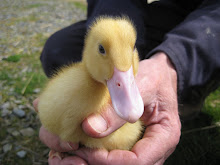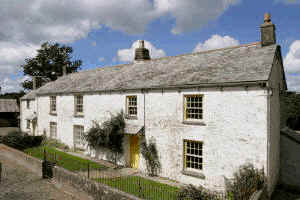 Winter is the season for major farm earthworks. Whilst the grass, trees, and hedgerows sleep there is heavy machinery at work remedying the trauma caused by decades of sheep and cows trampling at will through supposed boundaries and barriers. Devon hedge banks are strange ramparts, topped with hedgerow plants and trees, but unless they are kept steep sided with a thick palisade of thorny and spiny growth, lambs and sheep will bounce all over them, walk through them and create huge gaps that become livestock thoroughfares.
Winter is the season for major farm earthworks. Whilst the grass, trees, and hedgerows sleep there is heavy machinery at work remedying the trauma caused by decades of sheep and cows trampling at will through supposed boundaries and barriers. Devon hedge banks are strange ramparts, topped with hedgerow plants and trees, but unless they are kept steep sided with a thick palisade of thorny and spiny growth, lambs and sheep will bounce all over them, walk through them and create huge gaps that become livestock thoroughfares.So, as this year's five chosen banks have had their hedges laid and the earth beneath them scooped by the digger magician back into shape, fencing follows swiftly before the sheep are allowed access; it's not only lambs that like to play King of the Castle.
As a consequence of all this work I have become ultra familiar with each bend, slope and growth on these boundaries. I have walked back and forth, back and forth, fencing tools in hand, gazing first at the ground where the slumped earth has been removed and remade into banks, and then at the banks themselves. Once the early spring rains start, the soil will be quickly, naturally covered with grass and wild flowers, so this is the time for revelation.
The largest objects I find are several ancient ploughshares in fields that it was thought had never been ploughed. Covered in soil, something about the shape of that small piece above ground (too straight for a stone perhaps) makes me stop and tap with whatever tool I have to hand; then I tug and yet another large, heavy piece of carefully shaped metal comes into the light. I drop the ploughshares by gateways. I refuse to throw them out and like to look at them as I go in and out of a field, wondering how the place was peopled and worked in the past.
The banks are the places to find misplaced tools. I find a wrench of old design, clogged with soil and rusted solid, no doubt carefully placed on the bank whilst a back was stretched or shoulders rolled, and then forgotten in a moment of distraction. It reminds me to double check that all the fencing tools are brought away as we move from section to section.
And sometimes I find something more intriguing; shards of pottery with the date of George VI's coronation still clear or hand made thick glass from some bottle of liniment or beer. And just occasionally I find whole bottles; my favourite has the legend "Corner's Oils for Sheep and Cattle" moulded along the body.
The bottles stand on the high mantel over the fireplace, and again, make me wonder each time I glance at them, about the people on the farm in the past.

















9 comments:
I have a small length fo an ancient Cornish hedge at the end of my garden. This doesn't need a great deal of work as it is not very long.It is a delight to see how many birds utilise the hedge for feeding, nesting and flirting. A wonderful mini ecosystem.
amazing what you find isn't it? I do love those bottles, I really do.
Lovely that you preserve the hedges and are rewarded for your efforts in the shape of 'finds' from another time - you never know, you may find something valuable on day...
Winter is the season here nobody can get into the earth.
We have found nothing as yet - but I suppose the deeply incised lane that leads to Lower House must bear testament to man's footfall. Where did I read that it took around 300 years to create a sunken lane?
Kissa - does it have horizontal windblown Cornish oak?
Fpot - I'm rather fond of them myself
Hannah - I hadn't thought in terms of value - I doubt that riches were ever much of a problem round here!
Bretwalda - the earth here is sodden clay and you have to be careful not to compact the soil as you work.
M'ear - you may be looking at the moon when you could be looking at the stones...and who would blame you!
So interesting what is unearthed - my uncle has a big collection of giant horseshoes from the plough horses. He comes cross one every so often when he is ploughing (avec tractor)
Our horse field is on the site of a Victorian rubbish dump and things are turned up every so often. I have a lovely crystal (or cut glass) decanter top and various other oddments.
M&M - I love "oddments". The pretty stopper on that green glass bottle is stuck fast, but I will try gently to get it open.
Mmmm, I don't know if you agree but it's not the items themselves, the bottles or whatever, but the way they connect us with ordinary people so many years ago.
People who breathed, loved, worried about their children, their husband or their wife.
We are fortunate these days, perhaps, to have less to worry about than many who walked the fields or tended our countryside before us - although we probably seldom think so.
Great blog :-)
Post a Comment